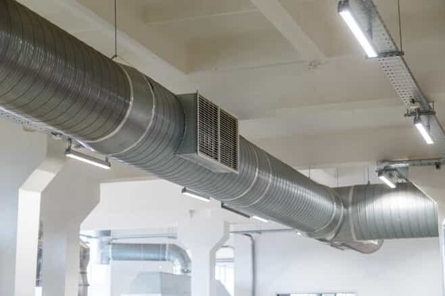HVAC systems are a critical part of any business. Heating and cooling units keep employees and customers comfortable during extreme temperatures, but if left in poor condition, they can quickly turn into a health hazard. Lack of proper maintenance and regular cleanings can turn a heating and cooling system into a breeding ground for mold, potentially damaging property, affecting employee health, and creating an unwelcome environment for customers. Because of this, professional HVAC cleaning is essential if mold issues ever make their way into your Lancaster commercial building.
Businessowners should be of mold and its harmful effects. Learn how mold develops, its dangers, and what to do if your business is contaminated. If mold growth has occurred in your HVAC systems, ServiceMaster Fire and Water Cleanup Services offers mold removal and commercial HVAC cleaning services. Our industry-leading restoration techniques help business owners clean their vents and remove harmful contaminants from their buildings.
How Mold Develops in HVAC Systems
HVAC systems cycle air through ductwork, coils, and filters, collecting dust and debris over time. As moisture from condensation on coils builds up, the likelihood of mold growth increases. Mold thrives in dark, damp environments between 40-100 degrees Fahrenheit, and business owners in Lancaster face additional challenges that increase the odds of mold growth. The city’s humid summers increase the likelihood of condensation, and its older infrastructures may not have updated ventilation systems.
Signs of Mold in your HVAC System
Mold is not always visible, but there are clear signs to watch out for if you think your business may be affected by this contaminant. Mold may be visible on or around air vents. If there is an earthy, unpleasant odor emitting from air vents, or visible black, green, or white spots around vents or ductwork, there may mold clogging your vents.
Health and Productivity Risks of Mold in the Workplace
Mold exposure can cause sickness. If employees or customers are exposed to mold for a prolonged period, they may experience respiratory problems, chronic headaches, or asthma flare-ups. Business owners must address mold issues as soon as possible or potentially face legal action from employees. If an individual experiences long-term effects of mold, such as organ damage or cancer, they may receive compensation for their damages.
Can Dirty HVAC Systems Cause Mold in Office Buildings?
Studies show poor HVAC system maintenance is a leading cause of indoor mold growth in commercial buildings. As HVAC systems accumulate moisture, dust, and debris, they become ideal breeding grounds for mold growth, creating an environment that can quickly turn hazardous if left untreated. In a city like Lancaster, older buildings with outdated HVAC systems are commonplace, and humid summers create damp environments within a commercial HVAC system. These two factors can lead to extreme mold growth that can potentially be hazardous to the health of employees and customers.
How to Prevent Mold Growth in HVAC Systems
HVAC systems require regular maintenance and upkeep to operate at peak levels. Schedule biannual HVAC maintenance service. Professionals can do a comprehensive inspection of a ventilation system, clean ducts, coils, and drip pans that hold dirt and debris, and put preventative measures in place to deter mold from regrowing.
Dirty air filters can cause the air quality in your business to feel stuffy or dirty. An unclean air filter allows pollutants to circulate throughout a commercial building and cause allergy-like symptoms such as itchy eyes, sore throat, or headaches. In extreme cases, this issue may lead to respiratory disease, heart disease, or cancer. Depending on usage, air filters should be replaced every 1-3 months.
A dehumidifier is a great way to prevent mold growth within your HVAC systems. Designed to remove moisture from the air and lower dampness levels in your building, dehumidifiers help control door humidity levels. Because Lancaster experiences humid summers, this tool can help prevent mold growth during the hot, humid months of the year.
The Importance of Regular Indoor Air Quality Testing
Regular indoor air quality testing helps to detect mold spores early so you can eliminate mold before it continues to spread throughout your business. Mold spores, the reproductive cells that spread mold, are invisible to the human eye. They cannot be seen, but they can be harmful if inhaled or absorbed through the skin. They can remain airborne in your building indefinitely and may cause fevers, headaches, or chronic fatigue.
Business owners should be heavily invested in maintaining their commercial building’s indoor air quality. Regular indoor air quality testing helps identify airborne contaminants that pose health risks to people occupying the building. Commercial buildings are required to comply with health and safety standards. Business owners working in public-facing industries such as hospitality and retail must be highly aware of the indoor air quality of their commercial buildings; employees may take legal action if their health is affected.
Establish an HVAC maintenance schedule to minimize the risk of mold growth in your business. Pairing regular indoor air quality testing with yearly HVAC cleanings is the best way to prevent mold growth and keep heating and cooling units in optimal condition. Working with a trusted HVAC cleaning company is the best way to receive yearly maintenance checks for a commercial ventilation system.
Why Choose ServiceMaster Fire and Water Cleanup Services for Mold Prevention and Remediation
Dirty HVAC systems can deter your business from operating at full capacity. Restore your commercial vents with the help of ServiceMaster Fire and Water Cleanup Services. For years, our HVAC cleaning experts have helped Lancaster business owners keep their commercial buildings clean and mold-free. Contact us to learn more about our services and schedule an inspection.


